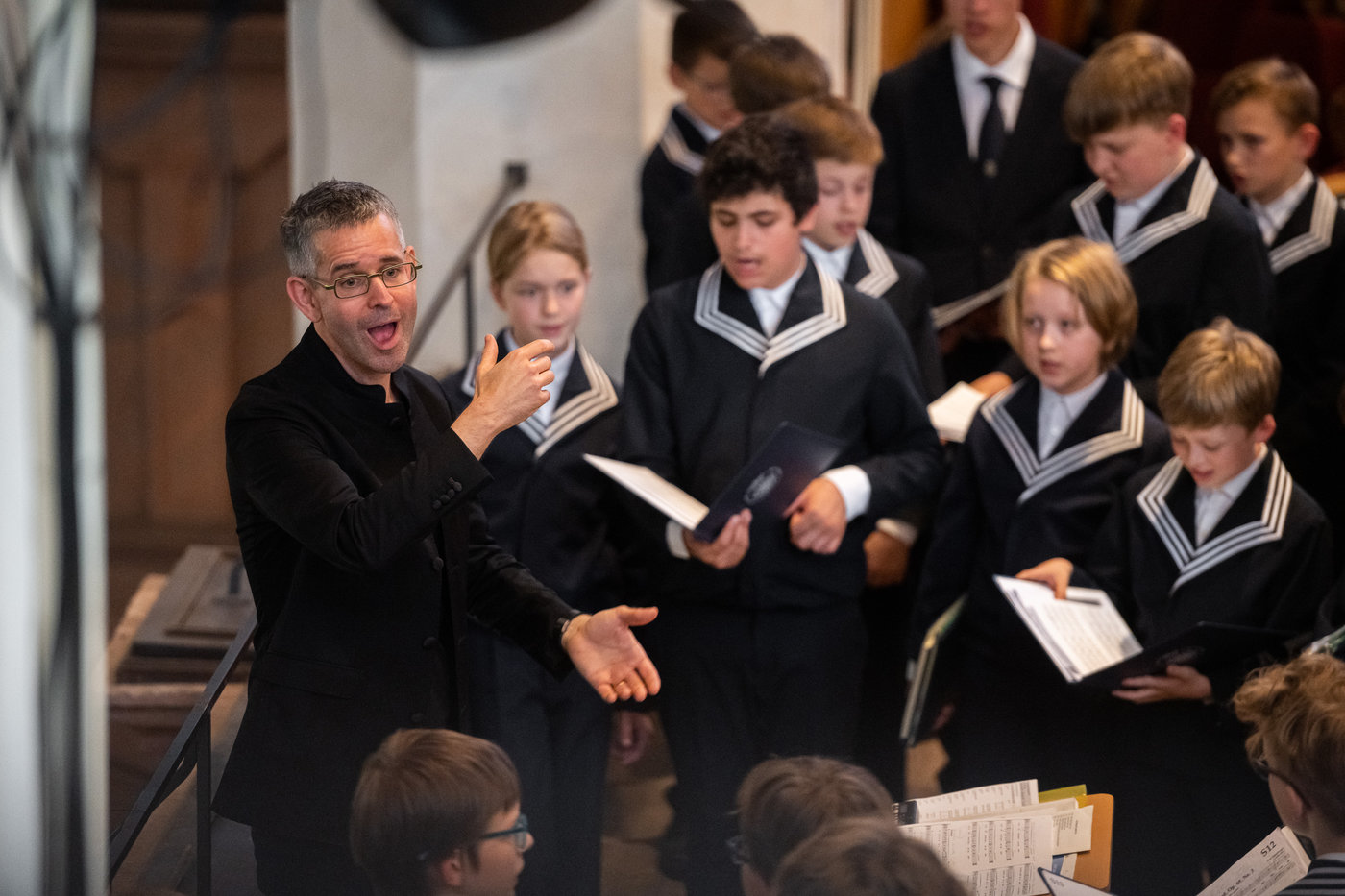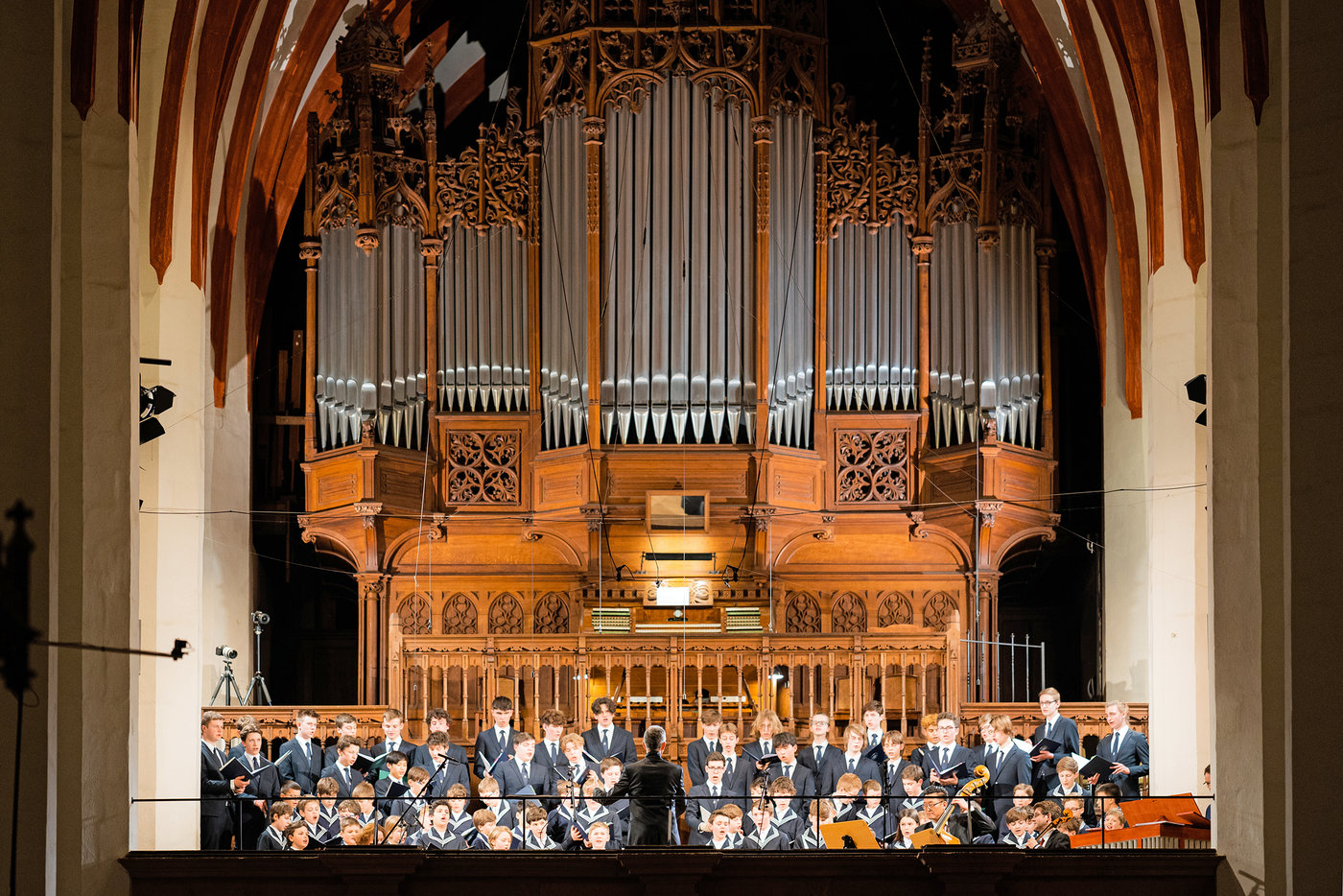Bach and charms: arrived in Leipzig
Leipzig celebrates Johann Sebastian Bach's permanent appointment as Thomaskantor 300 years ago. Swiss conductor Andreas Reize has been leading the Thomanerchor for around two years.

"Bach arrives" is written on the program booklet of the Thomanerchor Leipzig. On the one hand, the ambiguous concert title refers to the two application cantatas BWV 22 and 23, which Johann Sebastian Bach composed for his cantorate audition on February 17, 1723 in Leipzig's St. Thomas Church. On the other hand, the title also tells of the unique success story of Bach's music, which continues to radiate worldwide in the 21st century and makes him by far the most listened to composer in the classical music world today. Leipzig is celebrating 300 years of Johann Sebastian Bach. He worked here as Thomaskantor for 27 years, until his death on July 28, 1750.
Anniversary concert in St. Thomas Church
Andreas Reize is the 18th Thomaskantor to succeed Johann Sebastian Bach. For the anniversary concert, the Swiss composer has put together an extensive, challenging program that presents four- to five-part motets and sacred madrigals by other Thomaskantors such as Moritz Hauptmann, Gottlob Harrer and Johann Hermann Schein alongside the two Bach cantatas. Six-part compositions written for the St. Thomas Boys' Choir from the Spiritual choir music op. 11 by Heinrich Schütz will be performed that evening in the packed Thomaskirche Leipzig.
Traditionally standing in the gallery around the Wilhelm Sauer organ, the St. Thomas Choir unfolds a very transparent, yet voluminous sound. The clarity of the text is excellent. In many compositions, a dance-like gesture can be felt, which Reize demands with large, sweeping movements, often conducting in full bars. The choir's intonation, on the other hand, is occasionally cloudy. For example, the low male voices in Moritz Hauptmann's Kyrie and Gloria too dominant and also a touch too low, the balance gets out of kilter. But the simple final chorus of Jesus took the twelve to himself BWV 22 over the virtuoso orchestral accompaniment is particularly captivating in the bright boy sopranos. The Leipzig Gewandhaus Orchestra shines with rhythmic drive and exquisite soloists (oboes!). Bach's second application cantata You true God and son of David In Reize's interpretation, BWV 23 combines intimacy with lightness. The conductor is close to the choir and creates large arches.

Traditions and new concepts
Despite his first-class music, which pointed far into the future, Johann Sebastian Bach was only third choice when applying for the post of Thomaskantor. After the death of Johann Kuhnau, the Leipzig councillors had already elected Georg Philipp Telemann as the new Thomaskantor before he left the city three months later due to a significant salary increase from his employer in Hamburg. The Darmstadt court conductor Christoph Graupner also already had the important post in his pocket, but was not released by his employer. It was only then that the decision was made in favor of Johann Sebastian Bach, who had also been invited for good measure.
The election of Andreas Reize as Gotthold Schwarz's successor, on the other hand, was unanimous. It was only in the period following this that an open letter from some St. Thomas Boys' Choir members, who felt they had been ignored, caused unrest. They could not imagine a Catholic Swiss as head of the most renowned Protestant church music office. When talking to Reize in the alumni house, the St. Thomas Choir's boarding school opposite St. Thomas School, the man from Solothurn was tight-lipped about this: "After two years, I don't want to say a word about it. You can tell it's going really well." Reize also deals with the question of his conversion to Protestantism, which has since taken place, in a few words. "It was clear to me from the outset that I would convert - the press only found out about it a year later. Church is home for me. And my home is now St. Thomas Church and St. Thomas Parish."
The 47-year-old musician, who directed the traditional boys' choir at St. Ursenkathedrale in Solothurn until 2021, wants to look to the future and enjoys the daily, intensive musical work with the St. Thomas Boys Choir, who perform at least one Bach cantata every week during term time. Reize has introduced a fixed daily structure. When singing, he uses movement games and aids such as Therabands to increase body tension. "Sing better, sing without fear - and have fun sometimes," is his pedagogical concept. The emphatically self-confident conductor is also breaking new musical ground, having just recorded Bach's St. John Passion for the Rondeau label with a choir of just 24 members and the Akademie für Alte Musik Berlin in a special arrangement.
In his work with the Leipzig Gewandhaus Orchestra, historical performance practice is also important to him in terms of phrasing and vibrato design. Reize also appreciates the research work of the Leipzig Bach Archive, with whose director Peter Wollny and his team he is in regular contact. The new Thomaskantor is delighted that he will not only continue to conduct baroque operas every two years at Schloss Waldegg in Solothurn, but has also been asked by the Leipzig Opera to conduct this repertoire.
The city is proud of its music
In 2023, the Thomanerchor will take part in the multi-year Bach300" project and, alongside other choirs, perform Bach's first Leipzig cantatas, precisely timed to the church year. "It is a particular pleasure for us that we will be singing alternately in the Thomaskirche and the Nikolaikirche, as was customary in Bach's time but has not been practised since the ban in 1943," says Reize. With the motto "Bach for future Leipzig Bach Festival (June 8 to 18, 2023), the Thomanerchor will perform the following cantatas in the opening concert Sing to the Lord a new song BWV 225 and The wretched shall eat BWV 75 will premiere a cantata composed for the occasion by Jörg Widmann and will compete with boys' choirs from Dresden, Windsbach and Hanover in another cantata concert on June 15.
The Swiss misses the mountains in Leipzig. "I like the openness of the city and the many green spaces. Leipzig may be a big city, but it still has a village character." He really likes the fact that the Gewandhaus Orchestra and the St. Thomas Boys Choir are advertised at the main railway station. "Music is hugely important for the city here - unfortunately there is nothing comparable in Switzerland." And what does the Thomaskantor like about the music of Johann Sebastian Bach? The combination of words and music in his works is unique!"
Georg Rudiger was invited to "Bach arrives" by the project management "Bach300 - 300 years of Bach in Leipzig" in cooperation with Leipzig Tourism and Marketing.








